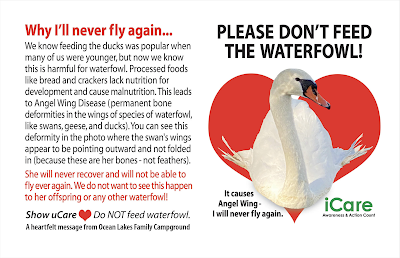Protecting our Waterfowl | An Interview with Carolina Wildlife Rehabilitation Center
As many of you remember, a few weeks ago, we had a juvenile swan come in contact with cooking oil in one of our lakes. The swan is still in the care of the Carolina Wildlife Rehabilitation Center and getting stronger each day.
Our team rescues many animals each week from different situations – Cooking oil, fishing line, being run over, etc. We want to take this opportunity to further educate our guests on how they can help protect the wildlife around us, as well as the environment.
To do so, we have gone straight to the experts – Carolina Wildlife Rehabilitation Center. Their Executive Director, Kim, is an expert in her field and works closely with the Ocean Lakes team to rescue and rehabilitate the animals in the campground, as well as the surrounding areas.
Carolina Wildlife Rehabilitation Center | Carolina Wildlife Rehabilitation Center rehabilitates birds of prey and other federally protected birds, mammals, and reptiles. Their mission is to mitigate human impacts on the environment’s native wildlife and ecosystems through professional medical treatment, education, and scientific research. Their team of rehabbers and volunteers are committed to helping animals; they take their convictions and turn them into actions.
Meet Kim | Kim is a hero in our book. She is making a difference and changing lives one animal at a time.
We sat down with Kim to talk about her role at CWRC and the important facts to know regarding our wildlife.
What is your role at Carolina Wildlife Rehabilitation Center?
I am the Executive Director and Rehabber at Carolina Wildlife Rehabilitation Center. I have been with CWRC for three years. I have always loved animals! When I got into wildlife photography, it sparked a passion to want to work with birds of prey, which drew me into the world of wildlife rehab.
How does CWRC help the animals in our community?
We rehab injured and/or orphaned animals, as well as educate our community on issues that can cause harm to our wildlife.
Explain why cooking oil, oil in general, is so dangerous to swans and other waterfowl.
When oil coats a bird’s feathers, it leaves them unable to regulate their body temperature and unable to fly. Depending on the type of oil, it can be toxic if ingested.
Angel wing is caused by a nutrient deficiency of vitamins and minerals combined with high carbohydrate and sugars levels. This deformity happens when they are young, and their wings are forming; the bone twists causing the feathers to point out. This can sometimes be corrected if caught very early, but most times it is a permanent disability rendering them flightless.
What is the biggest issue that swans face in our area?
We take in a lot of swans annually. The top reasons are for being hit by a car, fishhook/line injuries, and lead poisoning.
How can fishermen help protect our waterfowl?
Fishermen can help protect wildlife by ensuring they pick up all the items they brought with them, as well as making sure they are not leaving hooks or line for animals to get caught in and injured. Please clean up and properly dispose of any line/hooks/weights in the trash, or if available, fishing line recycling bins. Some do not realize waterfowl forage greenery on the bottom of the pond and will sometimes ingest small lead weights that were used for fishing. One of the top reasons for waterfowl being admitted to our center is for fishing line or hook injuries.
What is one small thing we can do to help the wildlife that inhabit our area/campground?
Education is key. Many people just do not know how many things are dangerous to wildlife. We urge everyone to clean up after themselves, dispose of your waste properly, and understand that while we may be enjoying this beautiful campground, this is their home. We need to take care of it.
Education is key. Many people just do not know how many things are dangerous to wildlife. We urge everyone to clean up after themselves, dispose of your waste properly, and understand that while we may be enjoying this beautiful campground, this is their home. We need to take care of it.
Until Next Time | Thanks, Kim, for the information and tips! You are right, education is key! We invite you all to stop by our Nature Center while you are in the campground and learn more about the environment around us and the animals that inhabit our surroundings. Together, we can make a difference.













Comments
Post a Comment